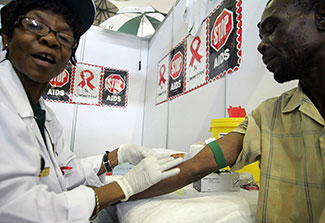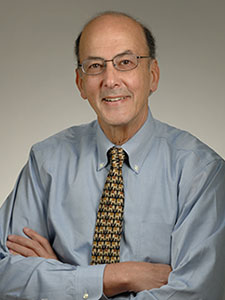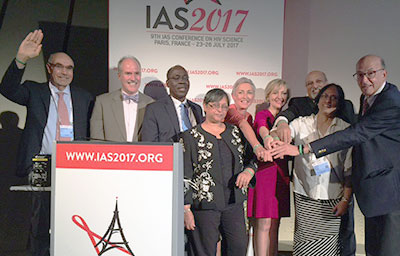Observing four decades of progress on HIV/AIDS
May / June 2021 | Volume 20 Number 3
Opinion by Fogarty Director Dr Roger I Glass
 Paballo Thekiso/AFP/Getty Images
Paballo Thekiso/AFP/Getty Images
This summer
marks 40 years since the CDC officially reported the first cases of the disease that came to be known as HIV/AIDS. Originally an almost certain death sentence, HIV is now largely a manageable chronic illness, thanks to global research efforts including those conducted and supported by NIH.
By the mid-1980s, HIV had begun to take hold in sub-Saharan Africa and other low- and middle-income countries with few resources to combat it. This growing need was a topic of discussion at the 3rd International AIDS Conference, held in Washington in 1987. Scientists recognized that research into this mysterious new disease was badly needed, not only in the developed world, but also in countries with different experiences in transmission, testing and patient care. But there was an enormous barrier - the lack of research capacity in areas most severely hit by the epidemic.
 Read recent
opinion pieces from Fogarty Director Dr. Roger I. Glass.
Read recent
opinion pieces from Fogarty Director Dr. Roger I. Glass.
Fogarty’s Dr. Ken Bridbord, co-convenor of the conference, quickly sketched out ideas for a new initiative. The following year the Center launched the
AIDS International Training and Research Program, known as AITRP, which provided significant research training to more than 2,000 individuals from at least 100 low- and middle-income countries.
This approach was groundbreaking and helped to build the level of expertise necessary for sustained research efforts to study the HIV/AIDS epidemic on the ground in the locations where suffering was greatest. Under the program, trainees from developing countries were selected to come to U.S. grantee institutions to learn from experts and work in well-equipped laboratories. Training courses were short- or long-term and covered many different levels and topics, including master’s and doctoral degrees, laboratory skills, proposal and paper writing, epidemiology, biostatistics, ethics and HIV/AIDS related biology. AITRP offered an unusual degree of flexibility, allowing the grantees to adapt to changing conditions.
AITRP trainees, newly empowered with knowledge, experience, mentors and an established network of collaborators, returned home with increased confidence and the ability to help their countries craft and implement locally relevant strategies to tackle HIV/AIDS. This enabled them to work as equal scientific partners with their high-income country peers. The program also benefited U.S. institutions, as visiting trainees brought an added dimension to classroom discussions with their firsthand knowledge of conditions and needs. The connections formed often led to long-term research collaborations and lasting friendships.
At the start, AITRP awardees were immediate beneficiaries of NIH's considerable investments in AIDS research. Fogarty's research-capacity efforts laid the groundwork for other NIH investments and AITRP alumni became the major foreign collaborators on numerous NIH-supported research projects. In addition, they have gone on to lead research supported by the Bill and Melinda Gates Foundation, the Elizabeth Glaser Pediatric AIDS Foundation, the World AIDS Foundation and others.
 Fogarty staff and former trainees and grantees gathered at the 2017 IAS meeting to review the long-term impact of the Center’s HIV/AIDS research capacity building programs.
Fogarty staff and former trainees and grantees gathered at the 2017 IAS meeting to review the long-term impact of the Center’s HIV/AIDS research capacity building programs.
With proof of concept, Fogarty transformed its entire extramural portfolio to focus on building core foundational capacity through research training programs in bioethics, genetics, informatics, stigma, and health and economic development. To meet changing needs, Fogarty consolidated AITRP with an implementation research training effort to form the
Fogarty HIV Research Training Program, which continues today.
Fogarty trainees contributed to scientific advances by helping to provide evidence that male circumcision and screening of the blood supply reduced HIV transmission; data that demonstrated the effectiveness of treatment as prevention; and confirmation that people living with HIV in low-resource settings could follow complex ART regimens.
Along the way, Fogarty has relied on NIH partners for support and expertise, including the Office of AIDS Research (OAR);
Eunice Kennedy Shriver National Institute of Child Health and Human Development (NICHD); National Cancer Institute (NCI); National Heart, Lung and Blood Institute (NHLBI); National Institute on Alcohol Abuse and Alcoholism (NIAAA); National Institute of Allergy and Infectious Diseases (NIAID); National Institute of Dental and Craniofacial Research (NIDCR); National Institute on Drug Abuse (NIDA); National Institute of Mental Health (NIMH); National Institute of Nursing Research (NINR); and the NIH Offices of Dietary Supplements (ODS) and Research on Women's Health (ORWH).
Today, the research priorities have shifted toward treating HIV as a chronic disease, dealing with co-infections and studying the long-term effects of antiretroviral treatment. Although much has been accomplished, we remain firmly committed to this battle. It’s time to end the HIV epidemic, both at home and abroad.
More Information
-
Epidemiologic Notes and Reports: Pneumocystis Pneumonia - Los Angeles
Morbidity and Mortality Weekly Report (MMWR), CDC, June 5, 1981 -
Establishing Fogarty’s HIV research training program: Q and A with Fogarty’s Dr. Ken Bridbord
Jul / Aug 2012
Global Health Matters -
Scientific findings by NIH-funded studies featuring former AITRP trainees
Jul / Aug 2012
Global Health Matters - Fogarty’s
AIDS International Training and Research Program [archive]
- Fogarty’s
HIV Research Training Program [current]
-
Reflect, Recommit, Reenergize, Reengage - Four for Forty
NIH Office of AIDS Research (OAR), June 2021 - Reflection on 40 years of HIV/AIDS research
Blog post by Dr Maureen M Goodenow, NIH Associate Director for AIDS Research and Director, NIH Office of AIDS Research, June 4, 2021 - CDC virtual exhibit:
Reflections on 40 Years of HIV
David J. Sencer CDC Museum -
HIV/AIDS
National Institute of Allergy and Infectious Diseases (NIAID) -
Recent opinion pieces from Fogarty Director Dr. Roger I. Glass
To view Adobe PDF files,
download current, free accessible plug-ins from Adobe's website.
Related Global Health Research Topics